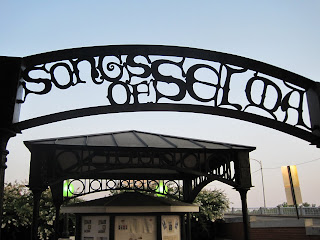
• You must say hello or wave to all people passing, including cars. I was repeatedly honked at by cars and had know idea what was going on. I originally thought I looked good that day, but the people were really just saying hi.
• Women always defer to their husbands to give directions to anywhere. It happened on multiple occasions, which was quite astonishing.
• Women were also astounded that I was traveling alone and repeatedly looked at me as if I were from another planet, which I guess sometimes I am.
• All food in the South is really good. I believe the secret is butter. The other secret is that homemade biscuits are served with everything.
• Advice: Don’t go into a home cooking place and try to order a low-fat salad dressing. I did this and the woman’s response was, “We don’t have that kind of thing here”.
• Sugar free drinks are few and far between and usually in the back of the refrigerator next to the old bologna packages.
• Many of the building in the small towns and some larger ones are boarded up. There is a hole in many parts of our country that needs to be filled. So many people are working on ways to bring industry back to their towns.
• Many cities in Mississippi claim to be the home of the blues… back to that push for industry.
• If ever in trouble or worried, explain you born in Mississippi or reference that your father was a minister. This quickly dissolves any anger that might be created by my living in Boston or having New Jersey plates on my rental car.
• White people generally think that race relations are good and headed in the right direction. Most black people believe it has come a long way but there is a lot more to be done. They deal with and talk about the subtlety of it that they deal with everyday, something most white people are not aware of or even think about.
• Young people rarely cite that there is an issue. It seems that most people under the age of 30 do not see race as a big deal, and this is across races.
• Many white people said that racism is reversed and that whites have it worse now.
• Many small and larger southern towns have African-American mayors and politicians. Mostly these positions are in local government and rarely reflect representation in a federal capacity.
• Schools are egregiously segregated. In almost all towns the public schools were 90 percent, if not more, black. Every town had one if not multiple private schools. People said they took out a second mortgage to send their children there. These schools are almost all white.
• Black parents do care about their children's education deeply, but in many situations they are economically disadvantaged so they are forced to keep them in the lower performing schools.
• Cotton planting ended about 10-20 years ago, which cut 2/3 of the farming jobs and has left an entire group or people and generation with nothing to do in Mississippi. On any regular day you will see hundreds of people sitting on their front porch. Like that one woman said , “we pray for a job as a form of work”.
• Most people want to talk or share their stories. The world would be much better, closer, and tolerant if we just took the time to listen and learn from each other.
• City with most profound impact: Selma, AL- I will never forget the people's faces and the sun setting over the city that has been forgotten. It is a really interesting city with a a history steeped in voting rights, that now has some fantastic grassroots organizations, a cool historic hotel on the river, and so much more.





